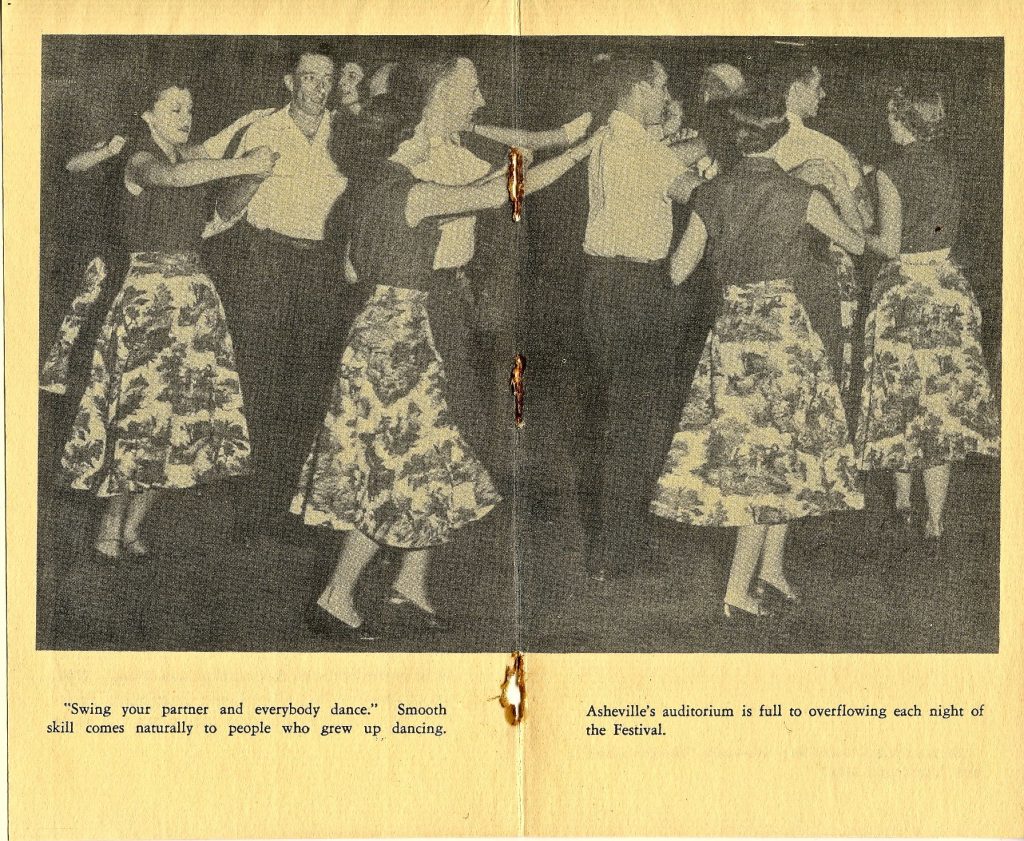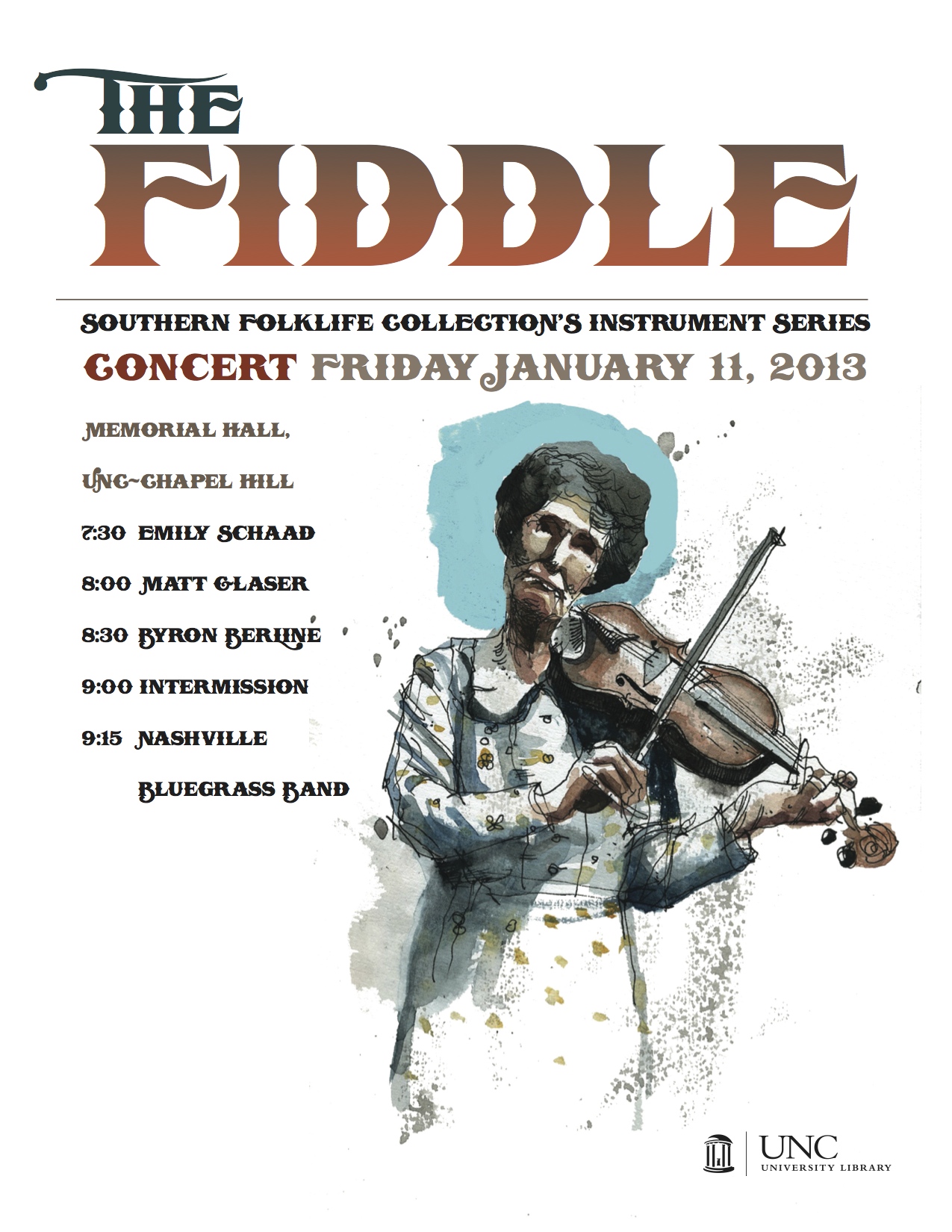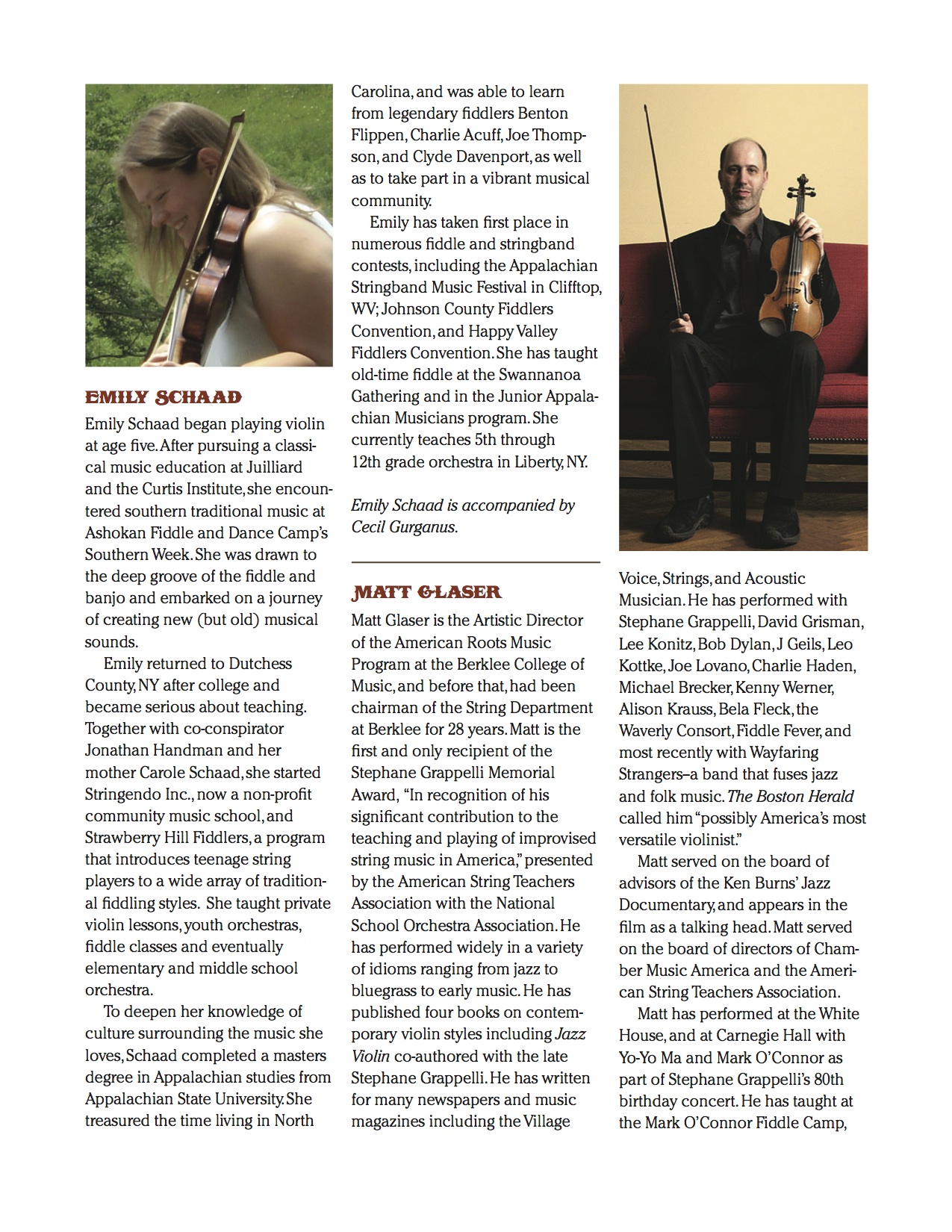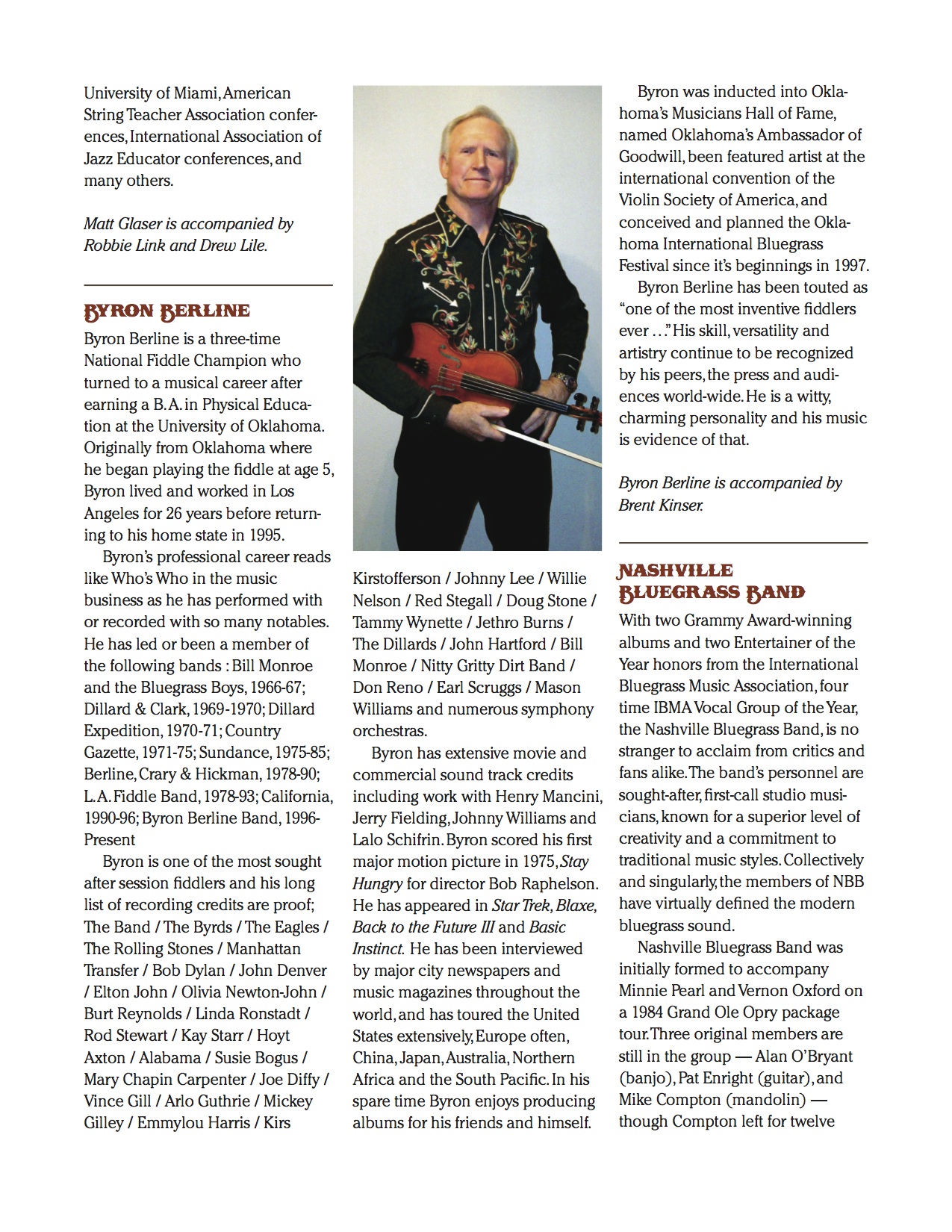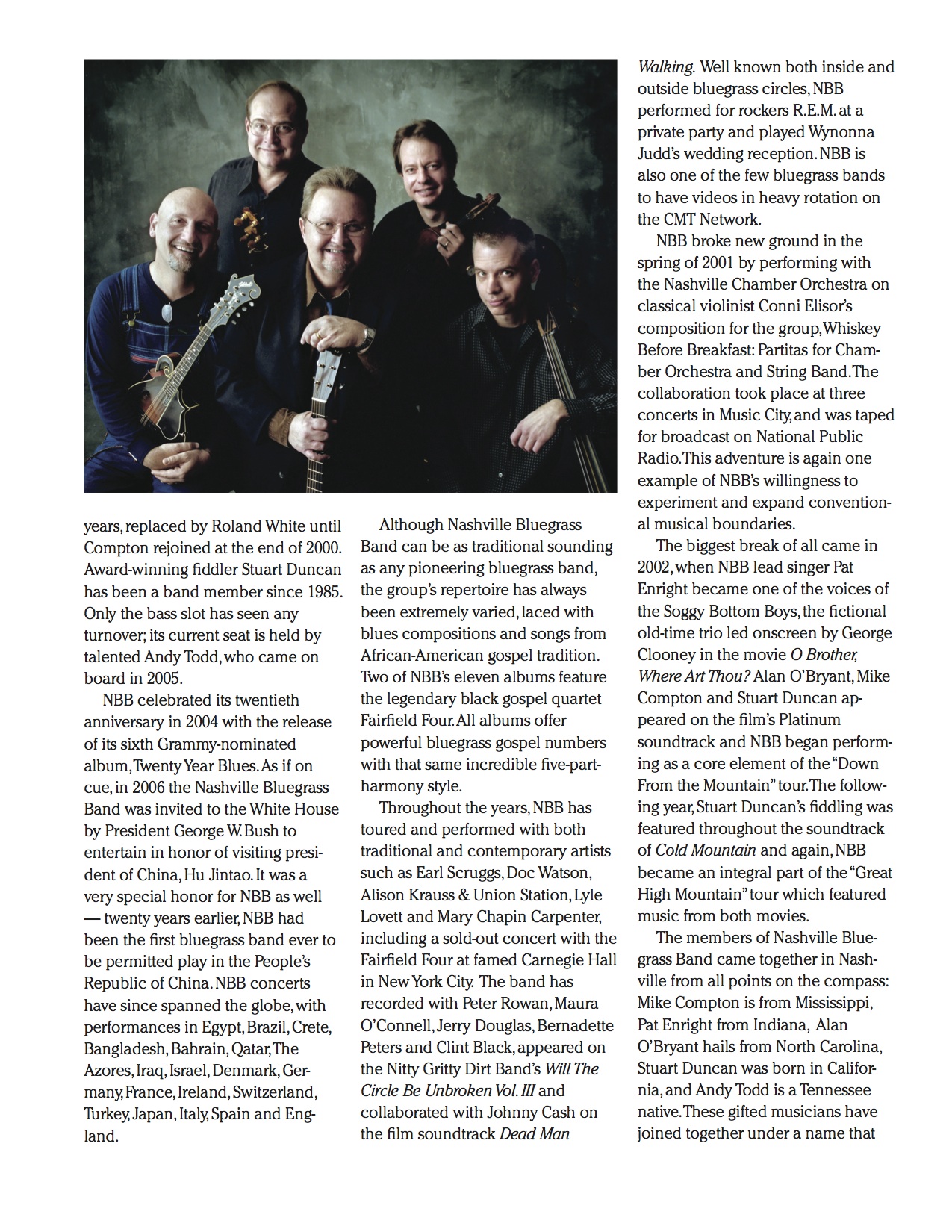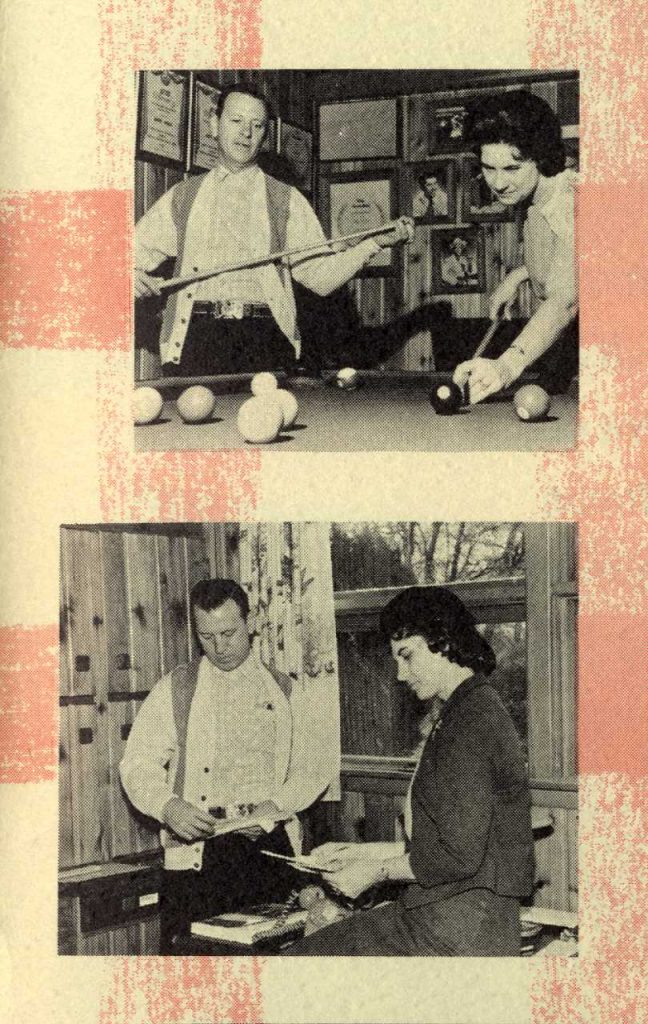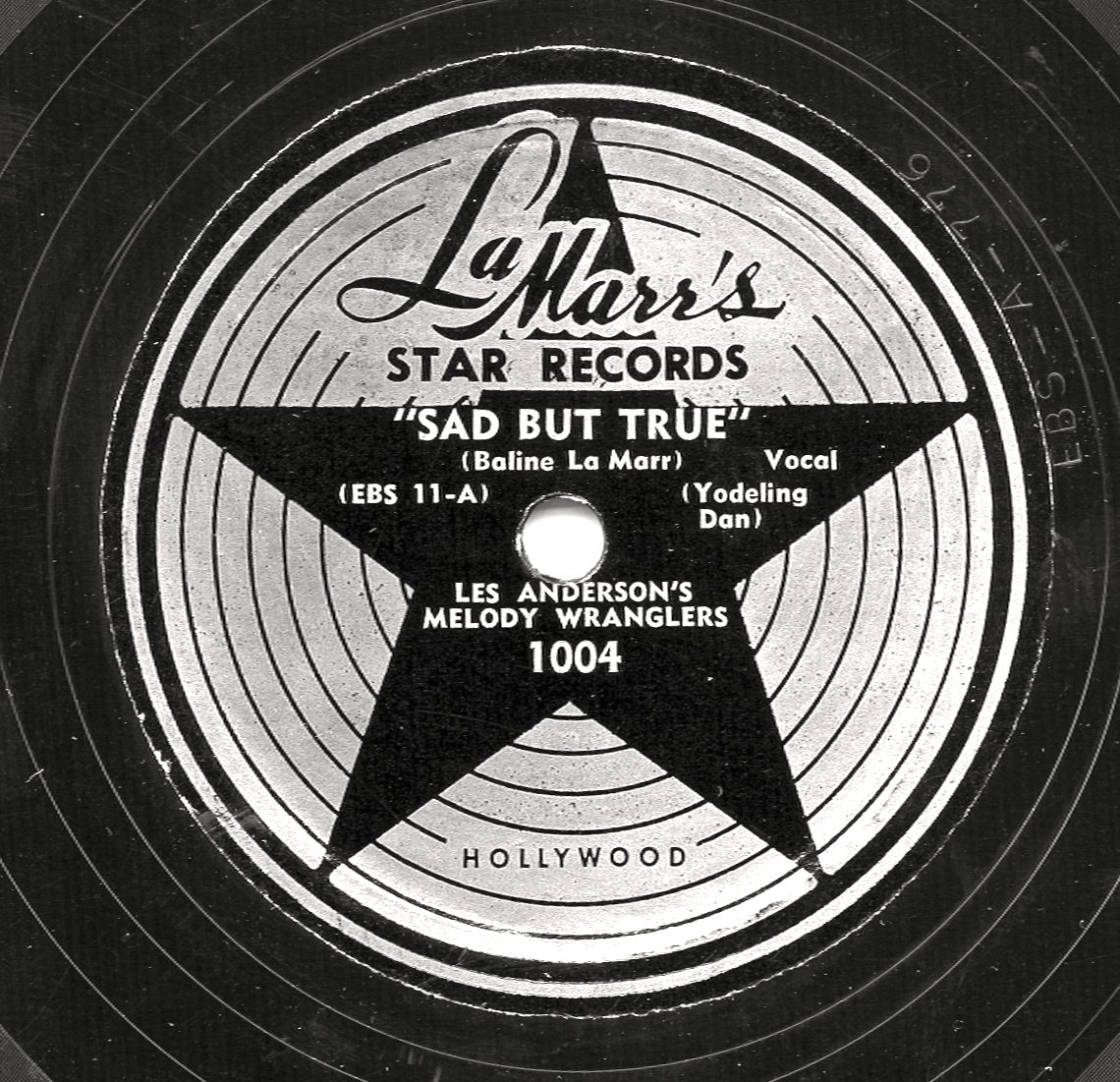
A Friday afternoon treat for you from one of two discs at the Southern Folklife Collection released on La Marr’s Star Records, a Hollywood based regional record label owned and operated by the remarkable Baline La Marr (more on Ms. La Marr in the next post). For now, enjoy Les Anderson’s Melody Wranglers version of “Sad But True” from 78 rpm disc call number 78-9188. Anderson, also known as “Carrot Top,” saw his career take off in 1942 with Bob Wills and his Texas Playboys as the replacement of legendary steel guitarist Leon McAullife who was drafted into the Navy. Anderson travelled to California with the Playboys, and in1946 formed his own Melody Wranglers. He became a regular guest on the western swing radio show “Spade Cooley Time,” before eventually ending up on the classic country television broadcast, “Town Hall Party.” Come back next week for more of Baline La Marr’s Star records.78_9188_1
Category: Uncategorized
All rise for the piping of the haggis: Burns Night at the SFC
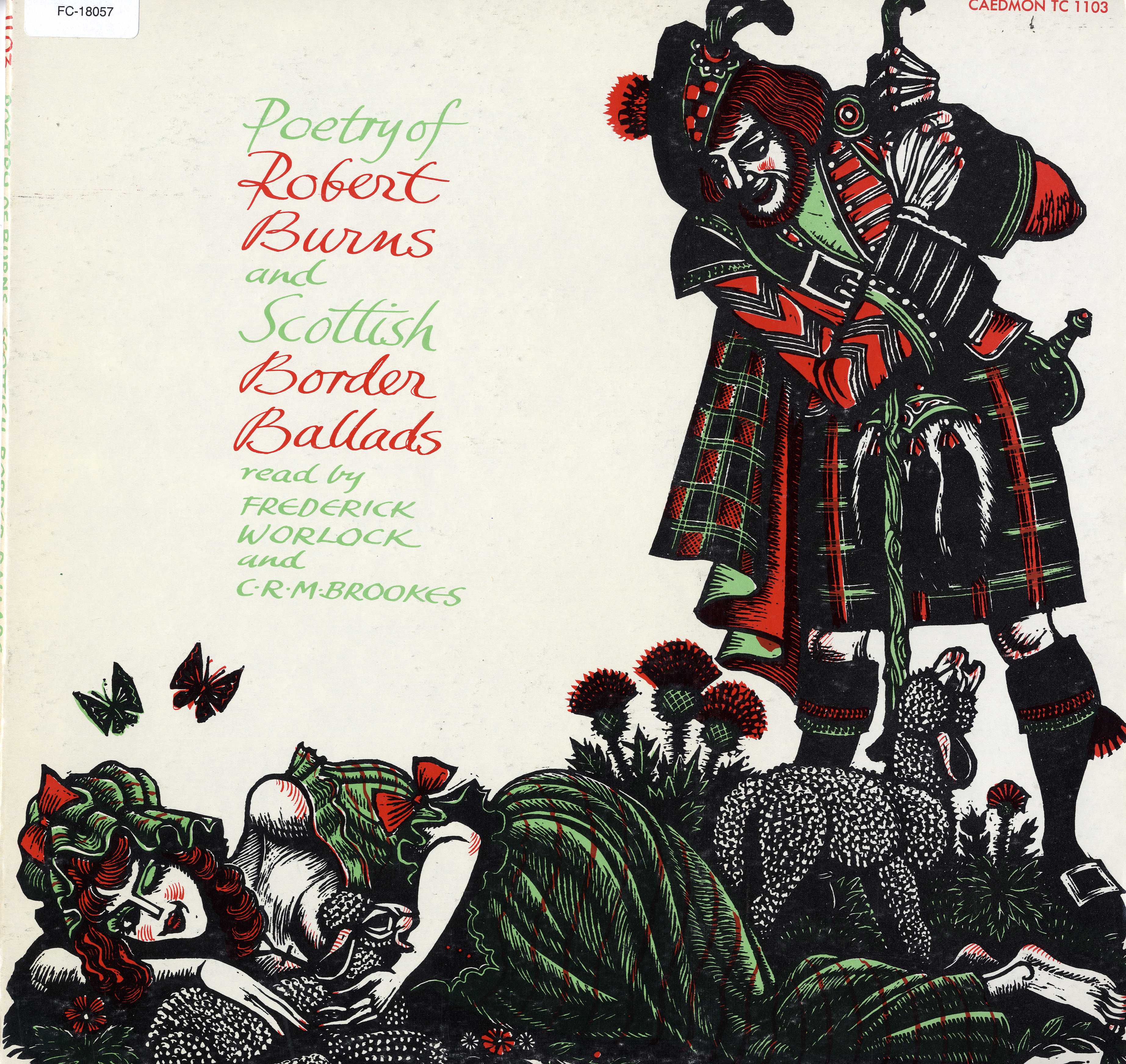 FC18057
FC18057
It’s Burns Day, and I hope you have been practicing your “Address tae the Haggis.” Folklorist, teacher, author, and friend of the Southern Folklife Collection, Burgin Mathews, hosts a Burns Supper that I will someday be lucky enough to attend, however this year I’ll have to offer the Immortal Memory address to myself in a quiet kitchen. Thankfully I found a wealth of supporting materials in the SFC to assist in my Burns Night activities. The LP pictured above, call no. FC18057, offers a great start with Frederick Worlock reading some of Robert Burns best, including “To a Louse (on seeing one on a lady’s bonnet at church).” Listen to the clip above.
Thanks to inspiration from the SFC’s recent Fiddle Concert and Symposium, I pulled out a record, call no. FC1508, produced by Mark Wilson that features some of his excellent recordings of Cape Breton musician Joseph Cormier. Scottish Violin Music from Cape Breton Island, kicks off with a perfect set of reels for Burns Night, “Haggis; Glennville’s Dirk; Bird’s Nest.” Listen to “Haggis” here:FC1508_Southern Folklife Collection
 Your guests will likely need some source material for their Burns recitations after dinner, so you may want to reference The Merry Muses of Caledonia, call no. PR4322.M42 1965, and possibly copy the glossary for those less familiar with the particulars of Scottish vocabulary. (click images to enlarge)
Your guests will likely need some source material for their Burns recitations after dinner, so you may want to reference The Merry Muses of Caledonia, call no. PR4322.M42 1965, and possibly copy the glossary for those less familiar with the particulars of Scottish vocabulary. (click images to enlarge)
Finally, no Burns Supper is complete without a rousing rendition of Robert Burns most famous and most misunderstood poems, “Auld Lang Syne.” I never imagined that I would someday offer the following advice, but take a cue from Guy Lombardo and His Royal Canadians and pour your heart and soul into the song (it may help if you have a cup of “uisge beatha,” aka the “water of life, aka Scotch whisky, in advance). Sing along won’t you? 45_2046
For auld lang syne, my jo,
for auld lang syne,
we’ll tak a cup o’ kindness yet,
for auld lang syne.
The Fiddle: Southern Folklife Collection's Instrument Series Concert and Symposium
Holiday in the stacks: Christmas in Heaven with Zeke Clements
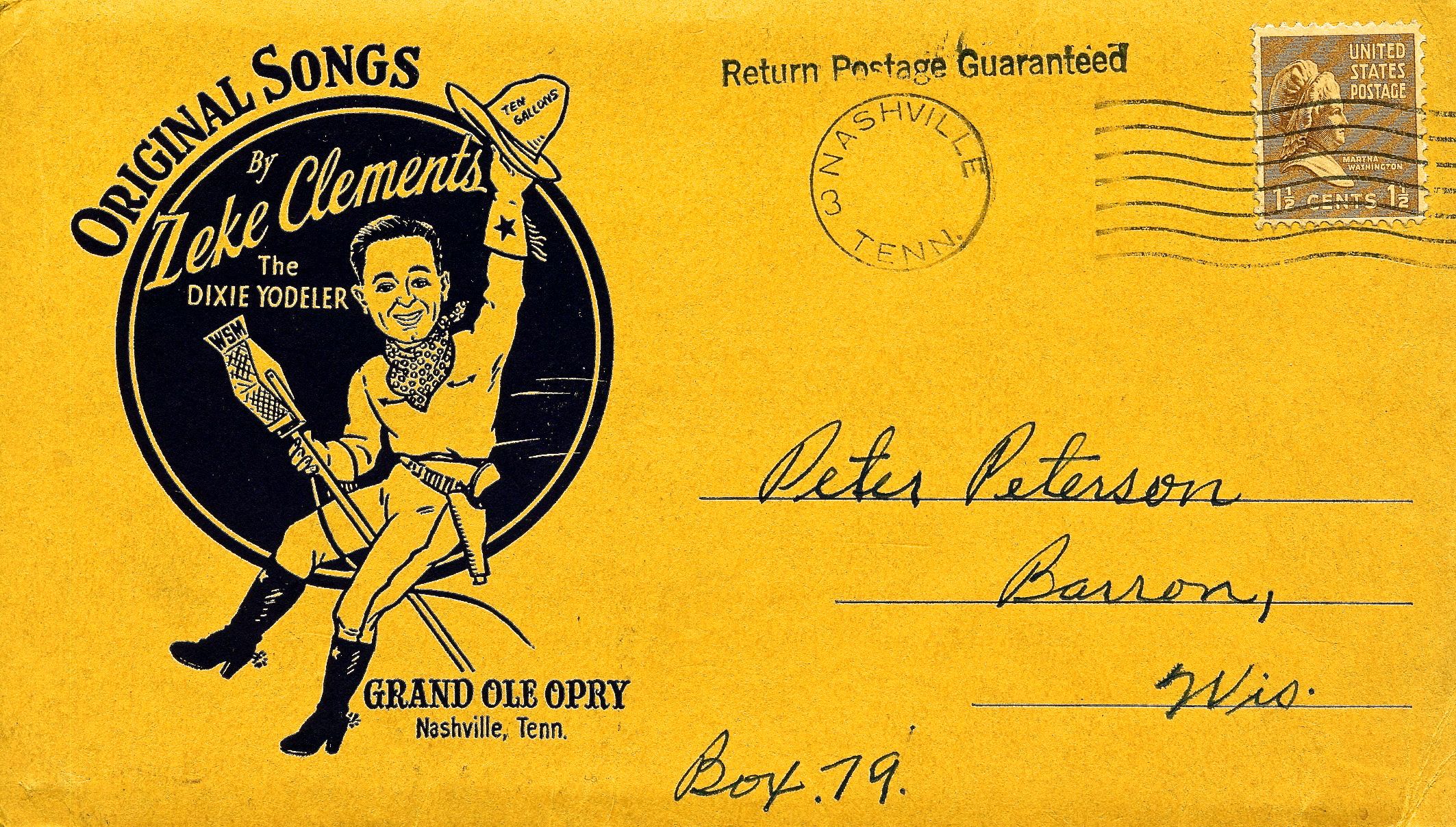
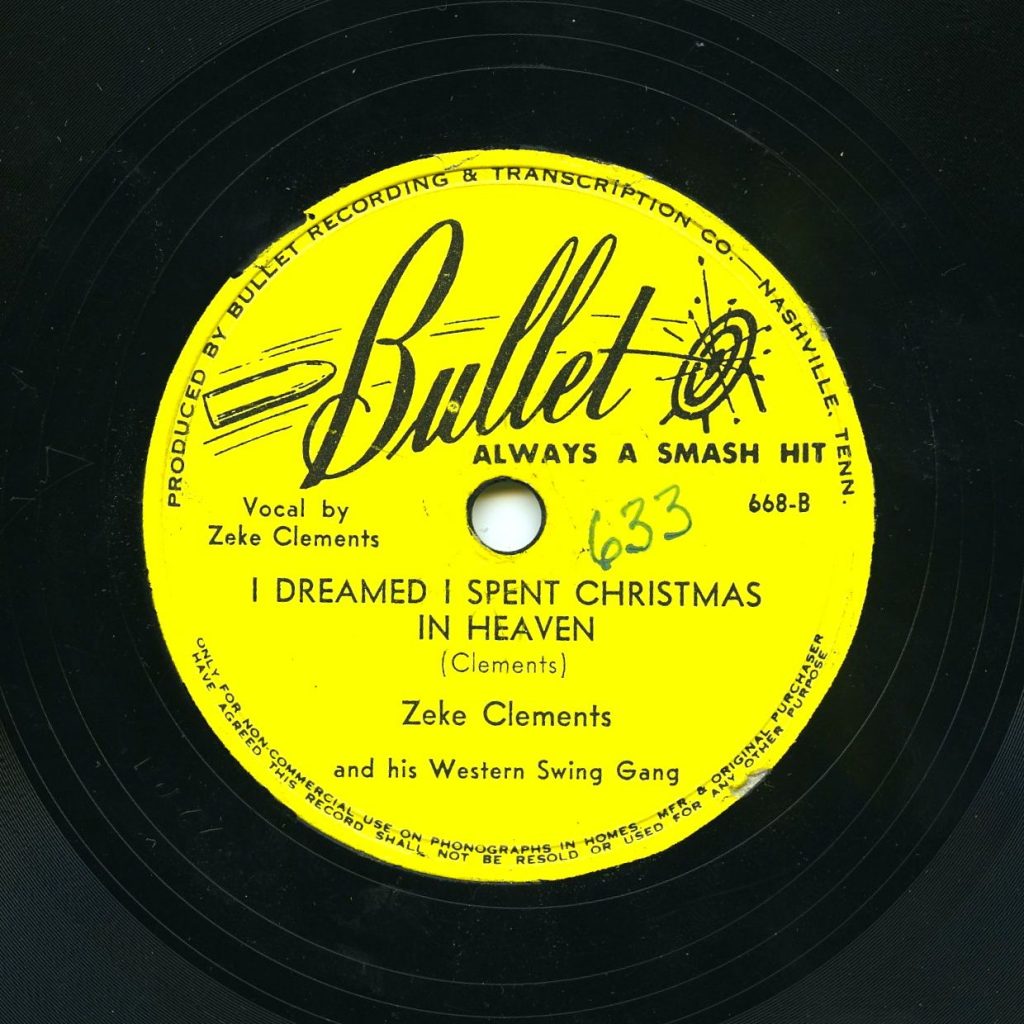
Today brings another new (to us) holiday tune from the stacks. This one comes from Zeke Clements, aka The Dixie Yodeler, who penned “Smoke on the Water” (not the Deep Purple version). Of Cherokee descent, Clements was born and raised in Alabama. He recorded with hillbilly string bands and Western Swing ensembles, developing his own unique style of hillbilly rock and boogie. After a few years on the WSM Grand Ole Opry, Clements became a singing cowboy, appearing in several westerns and eventually landing a role as the voice of Bashful in Disney’s Snow White and the Seven Dwarfs.
Here we have a Clements holiday gospel original, “I Dreamed I Spent Christmas in Heaven,” from call no. 78-1468. Clements and his Western Swing Gang recorded the side for Bullet Records out of Nashville, TN, a label started by veteran WSM promoter and early Sun Records investor, Jim Bulleit, along with C. V. Hitchcock. I Dreamed I Spent Christmas in Heaven
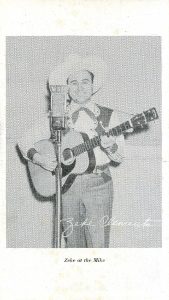 We also dug into the Southern Folklife Collection Artist Name Files, collection #30005 to find the song transcribed as part of a 1942 Zeke Clements songbook (which cost 1 1/2 cents to mail from Nashville to Barron, Wisconsin where I am sure Peter Peterson was happy to find it when he opened Box.79 one morning). One last holiday record tomorrow. Any requests?
We also dug into the Southern Folklife Collection Artist Name Files, collection #30005 to find the song transcribed as part of a 1942 Zeke Clements songbook (which cost 1 1/2 cents to mail from Nashville to Barron, Wisconsin where I am sure Peter Peterson was happy to find it when he opened Box.79 one morning). One last holiday record tomorrow. Any requests?
(as always, click photos to enlarge)

Holiday in the stacks: Won't someone think of the children? Nat "King" Cole never forgets.
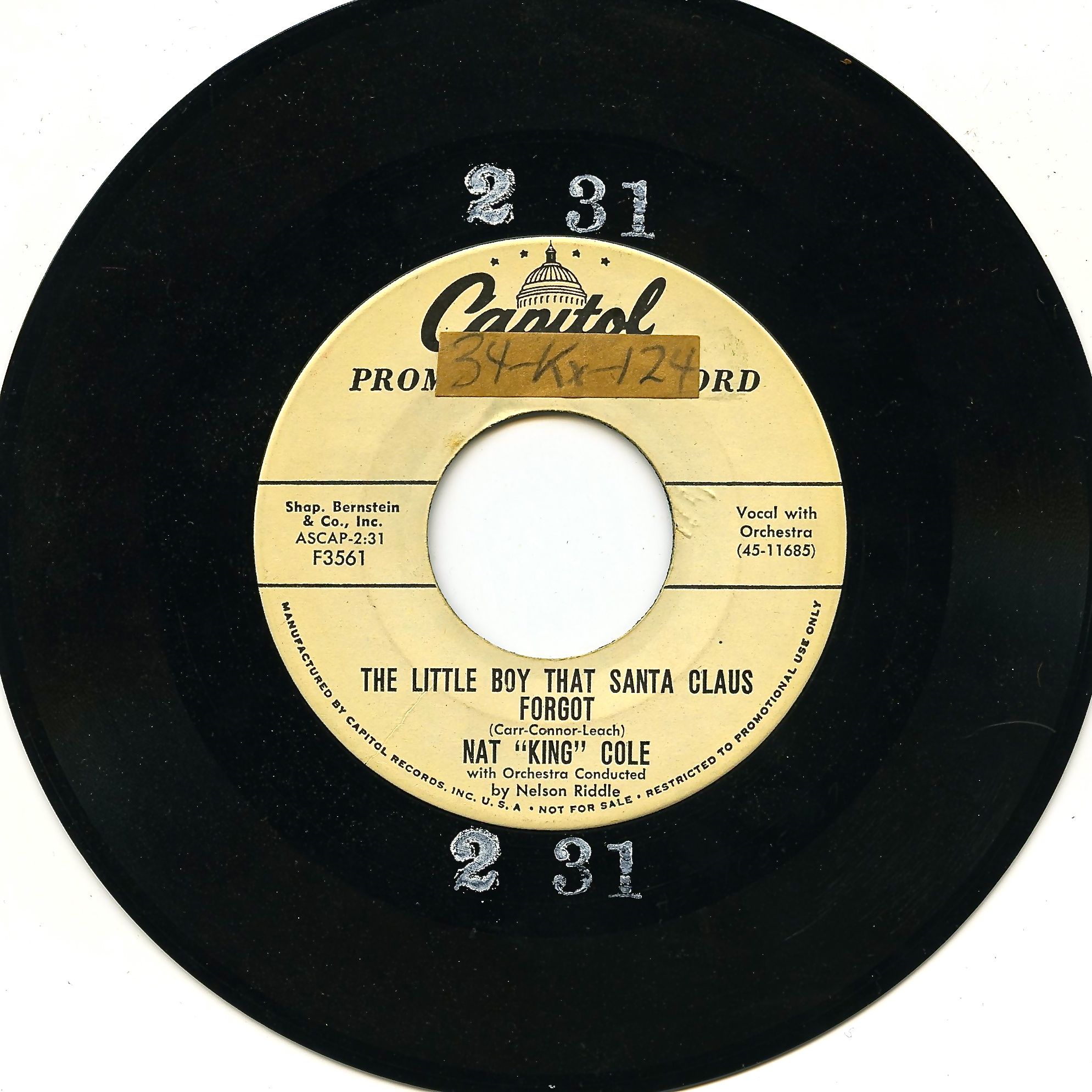 45_1179_Little boy santa claus forgot_2_Nat King ColeAnother treat from the stacks spinning at 45 rpm. This Capitol promo record, call no. 45-1179, has one of the most famous versions of one of the most famous holiday tunes ever written, appropriately titled “The Christmas Song,” but it’s this b-side that really brings on the tears. Especially as Nat King Cole goes into the spoken word section in the middle of the track.45_1179_The little boy that Santa Claus forgot_Nat King Cole
45_1179_Little boy santa claus forgot_2_Nat King ColeAnother treat from the stacks spinning at 45 rpm. This Capitol promo record, call no. 45-1179, has one of the most famous versions of one of the most famous holiday tunes ever written, appropriately titled “The Christmas Song,” but it’s this b-side that really brings on the tears. Especially as Nat King Cole goes into the spoken word section in the middle of the track.45_1179_The little boy that Santa Claus forgot_Nat King Cole
We make no apologies for our sentimentality and this tune hits hard. We thank you readers for all your support of the Southern Folklife Collection over the past year. We’re not checking out just yet, still got some work to for the upcoming SFC Fiddle Concert and Symposium, January 11 and 12 (Free tickets available now from the Memorial Hall Box Office), and we still have a few more holiday treats to share. But for now I’ll let Mr. Cole sing us out.45_1179_Nat King Cole_Christmas Song
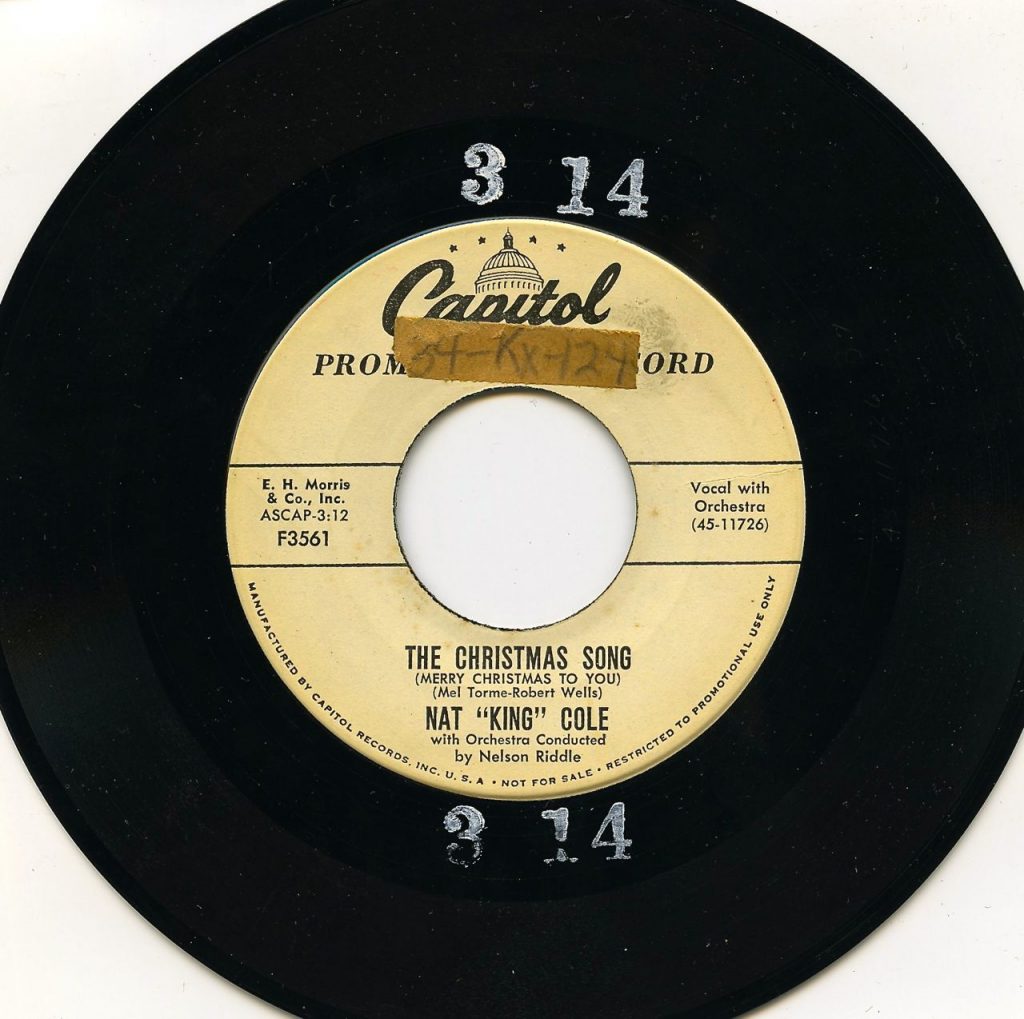
Holiday in the stacks, with snacks! Courtesy of Kitty Wells
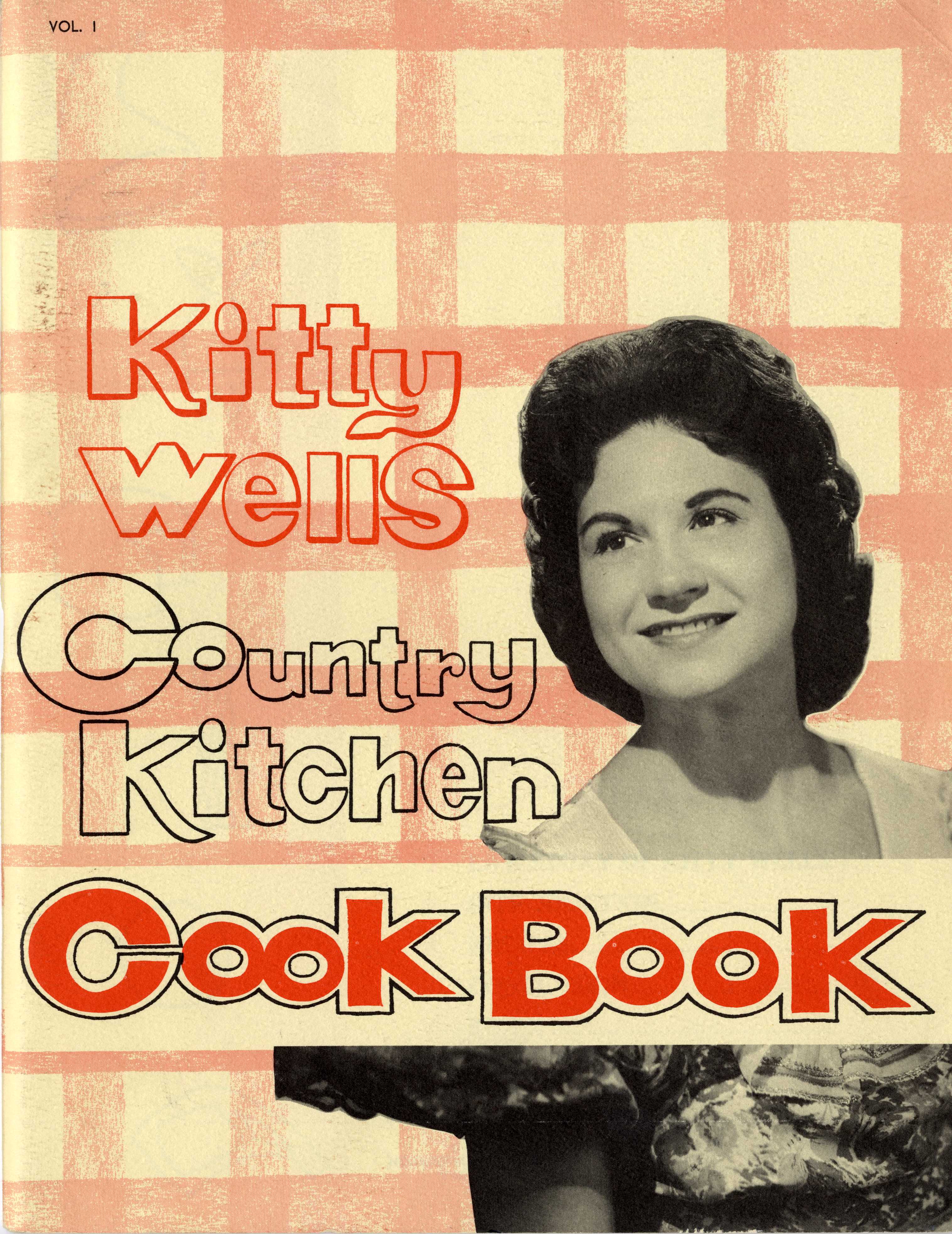 As promised, a few more holiday treats for the snack table. These come courtesy of the Kitty Wells Cook Book, vol. 1 (1964), from NF2158 in the Southern Folklife Collection Artist Name Files (#30005). Start off the night with a “Pink Quickie,” before enjoying a delicious “Cranberry Christmas Mold” and some “Holiday Fruit Cookies.” A party menu like no other! Perfect for shooting pool with good friends, like Kitty Wells husband, Johnny Wright (pictured below). Come back tomorrow for some more Southern Folklife Collection holiday finds.
As promised, a few more holiday treats for the snack table. These come courtesy of the Kitty Wells Cook Book, vol. 1 (1964), from NF2158 in the Southern Folklife Collection Artist Name Files (#30005). Start off the night with a “Pink Quickie,” before enjoying a delicious “Cranberry Christmas Mold” and some “Holiday Fruit Cookies.” A party menu like no other! Perfect for shooting pool with good friends, like Kitty Wells husband, Johnny Wright (pictured below). Come back tomorrow for some more Southern Folklife Collection holiday finds.
(as always, click images to enlarge)
Holiday in the stacks: A Kitty Wells Christmas Extravaganza
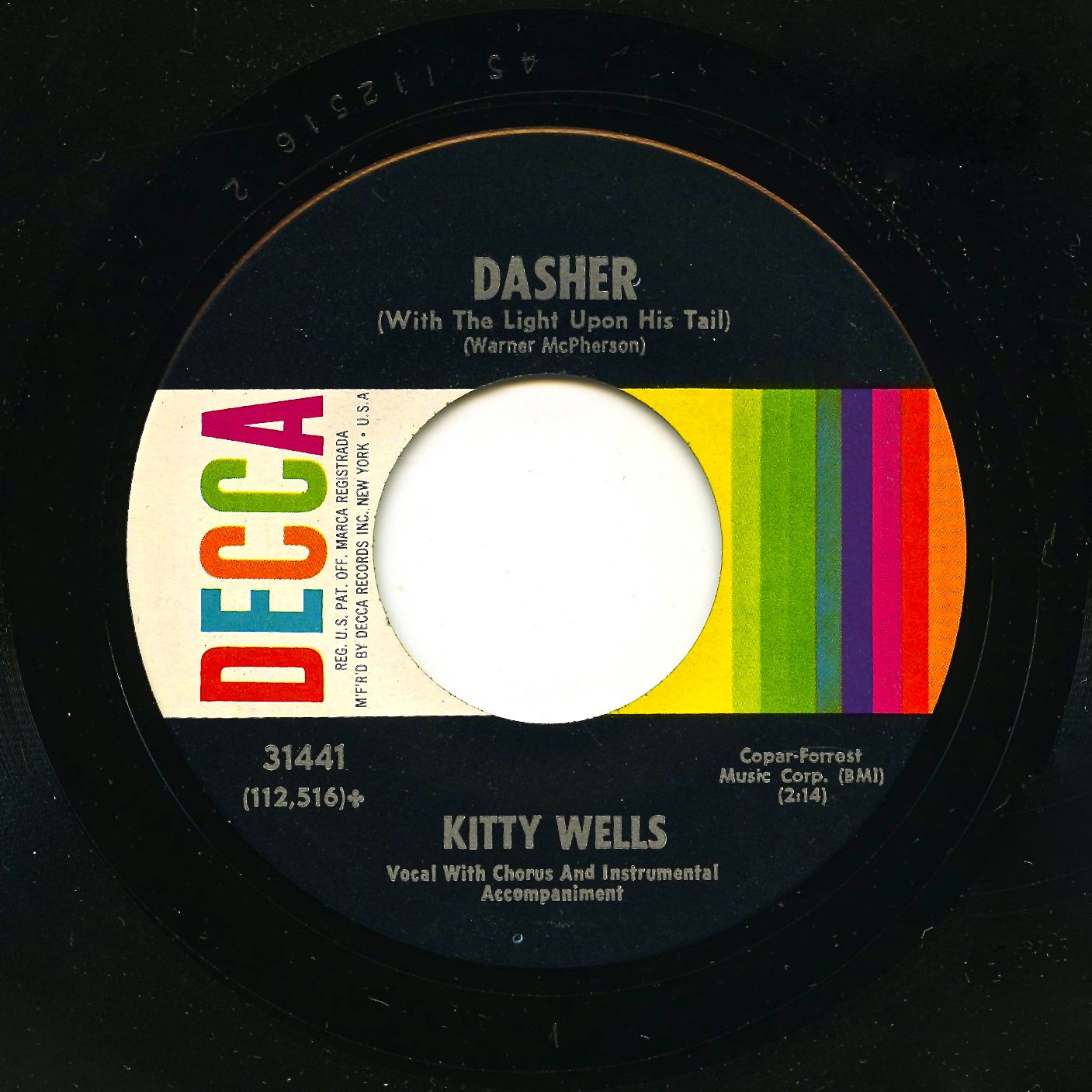 Holiday times can be pleasantly quiet times in Wilson Library and the Southern Folklife Collection (unlike the rest of the year when UNC is in session), but the work in the archives never stops.
Holiday times can be pleasantly quiet times in Wilson Library and the Southern Folklife Collection (unlike the rest of the year when UNC is in session), but the work in the archives never stops.
In the midst of moving in new collections (like the just arrived Russ D. Bernard Collection which includes the archives of Country Music Magazine and the Journal of the American Academy for the Preservation of Old-Time Country Music), planning the upcoming Fiddle Concert and Symposium (free tickets available now), and digitization projects, we pulled a slew of holiday treats from the stacks to share. First up, from call no. 45-2168, the Queen of the Answer Song, Kitty Wells (along with the great Jordanaires) singing “Dasher With the Light Upon His Tail.” 45_2168_Dasher with the light upon his tail_Kitty Wells_Southern Folklife Collection
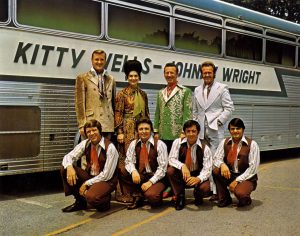
This isn’t really an answer song, but some bizarre attempt to usurp Rudolph’s status as the lightbringer. It comes as no surprise that this tune did not become part of the American carol canon, but it isn’t without merit. Just listen to the Jordanaires say “Dash Away!” 45_2168_DashAway_Kitty Wells and the Jordanaires_Southern Folklife CollectionThe b-side makes up for the lackluster attempt to outshine Rudolph with a classic honky-tonk tearjerker, “Christmas Ain’t Like Christmas Anymore.”45_2168_Christmas ain’t like christmas anymore_Kitty Wells
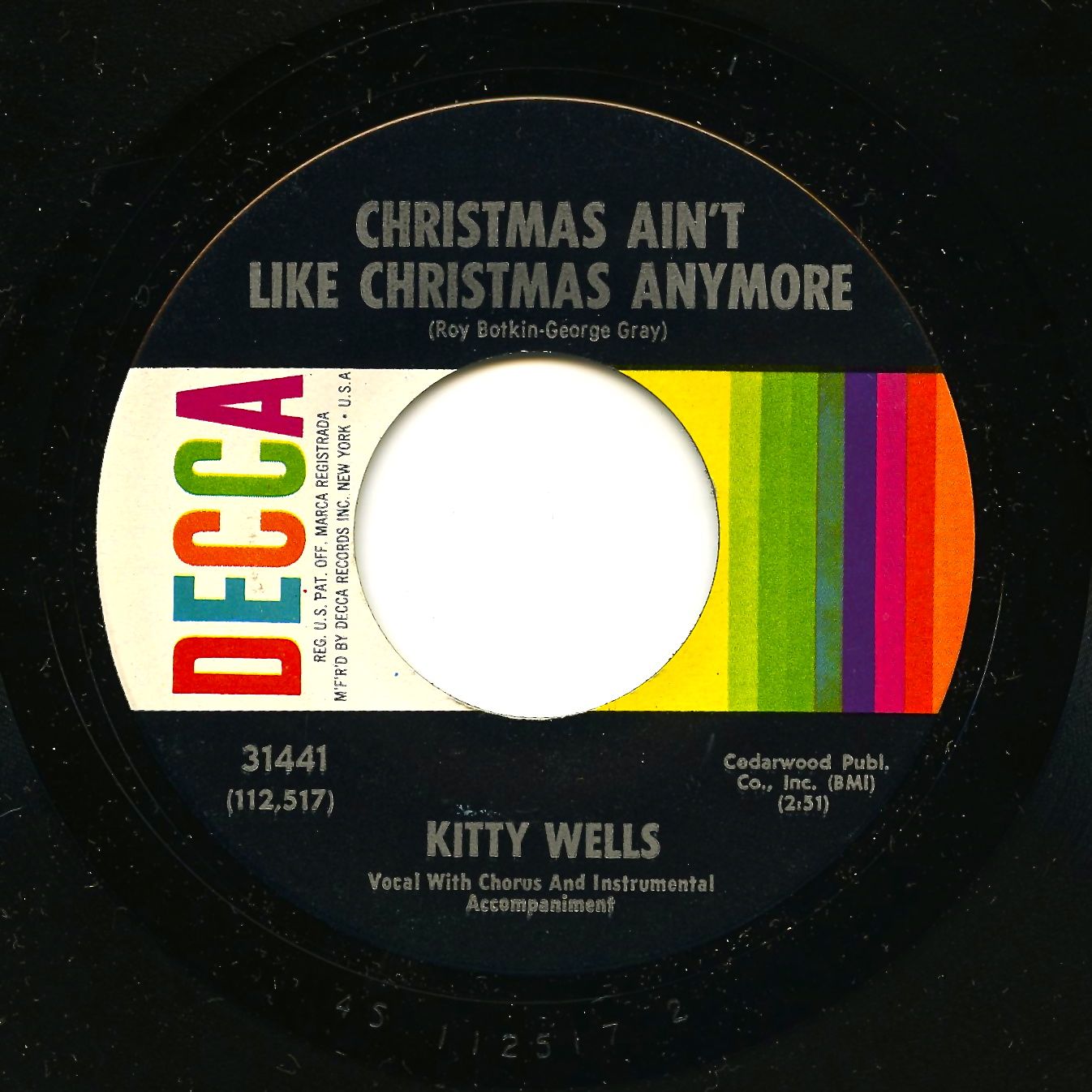
If any of you have any favorite heartbreak holiday tunes, please do let us know. We’ll be bringing you more holiday treats throughout the week. We might even pull out Kitty Wells recipes for Cranberry Christmas Mold and Holiday Fruit Cookies from the Kitty Wells Cookbook and have a party.
June Carter in the Ed Kahn Collection
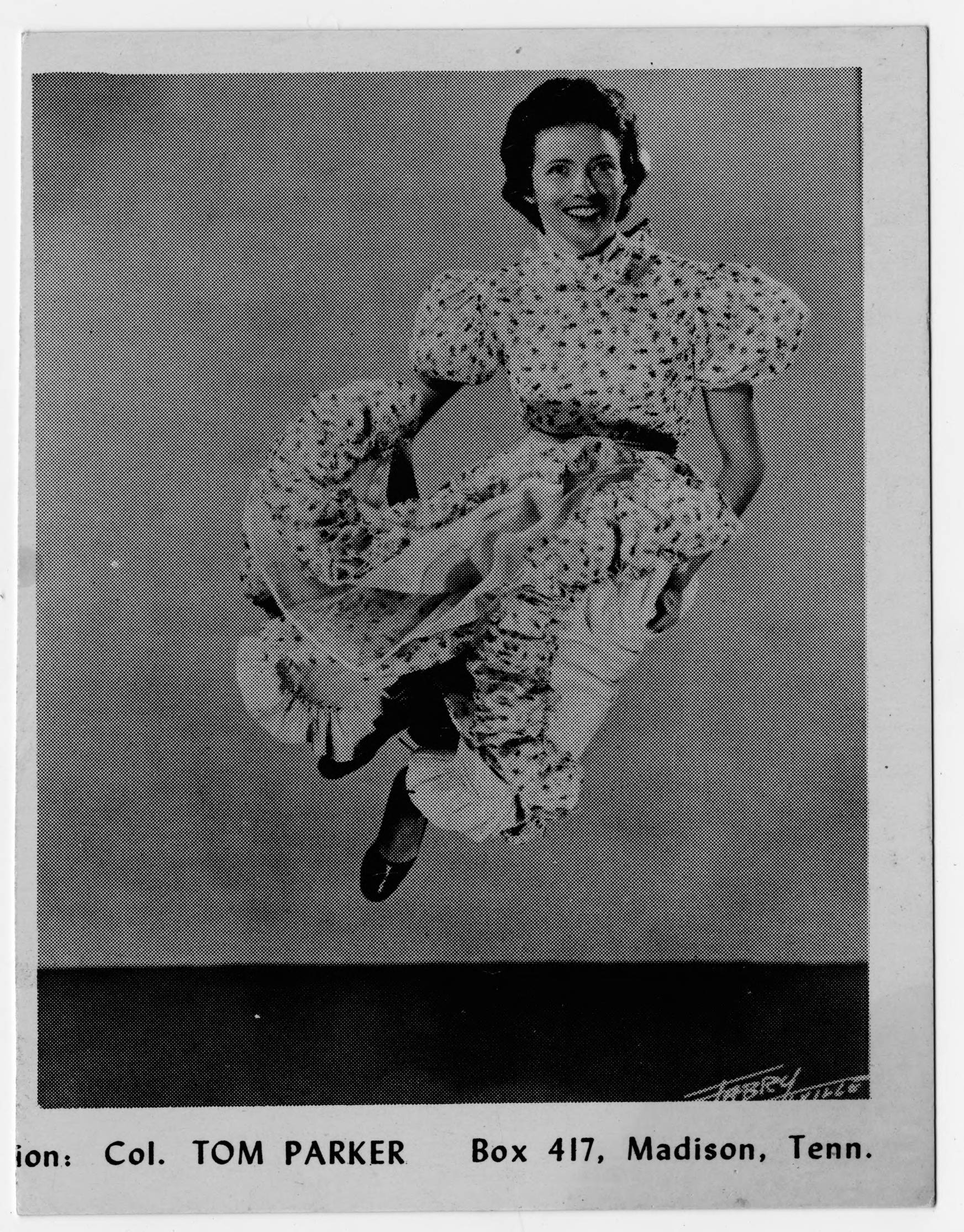 The Digital Southern Folklife Collection continues to add content at a steady rate. One of the recent additions includes the photographs from the Ed Kahn Collection (#20360). Among numerous photos of the Carter Family and Merle Travis is the publicity shot of June Carter, mid-leap, featured above. Also note Ms. Carter’s manager, the Colonel himself, Tom Parker (aka Andreas Cornelis (“Dries”) van Kuijk).
The Digital Southern Folklife Collection continues to add content at a steady rate. One of the recent additions includes the photographs from the Ed Kahn Collection (#20360). Among numerous photos of the Carter Family and Merle Travis is the publicity shot of June Carter, mid-leap, featured above. Also note Ms. Carter’s manager, the Colonel himself, Tom Parker (aka Andreas Cornelis (“Dries”) van Kuijk).
Scholar and folklorist, Ed Kahn (1938-2004) spent much of his life devoted to the study of American folk songs and early country music, conducting extensive field research and writing at length about both Merle Travis and the Carter Family. Kahn was was involved in the creation of the John Edwards Memorial Foundation (JEMF), along with Archie Green, D. K. Wilgus, Fred Hoeptner, and Eugene Earle. He was initially appointed Executive Secretary of the JEMF and was instrumental in starting the JEMF Quarterly newsletter. The collection consists of papers, photographs, and audiovisual materials relating to Kahn’s research documenting American folk songs, Mexican border radio, and early country music and recording history.
Carter Family research materials include personal and professional correspondence; research files related to Ed Kahn‘s dissertation, “The Carter Family: A Reflection of Changes in Society”; transcripts documenting interviews with members of the Carter Family and people associated with them; letters to and from members of the Carter Family and their friends, family, and business associates; and handwritten songs found in a cabin where Sara Carter stayed after divorcing A. P. Carter.
Any ideas on what the autograph says?
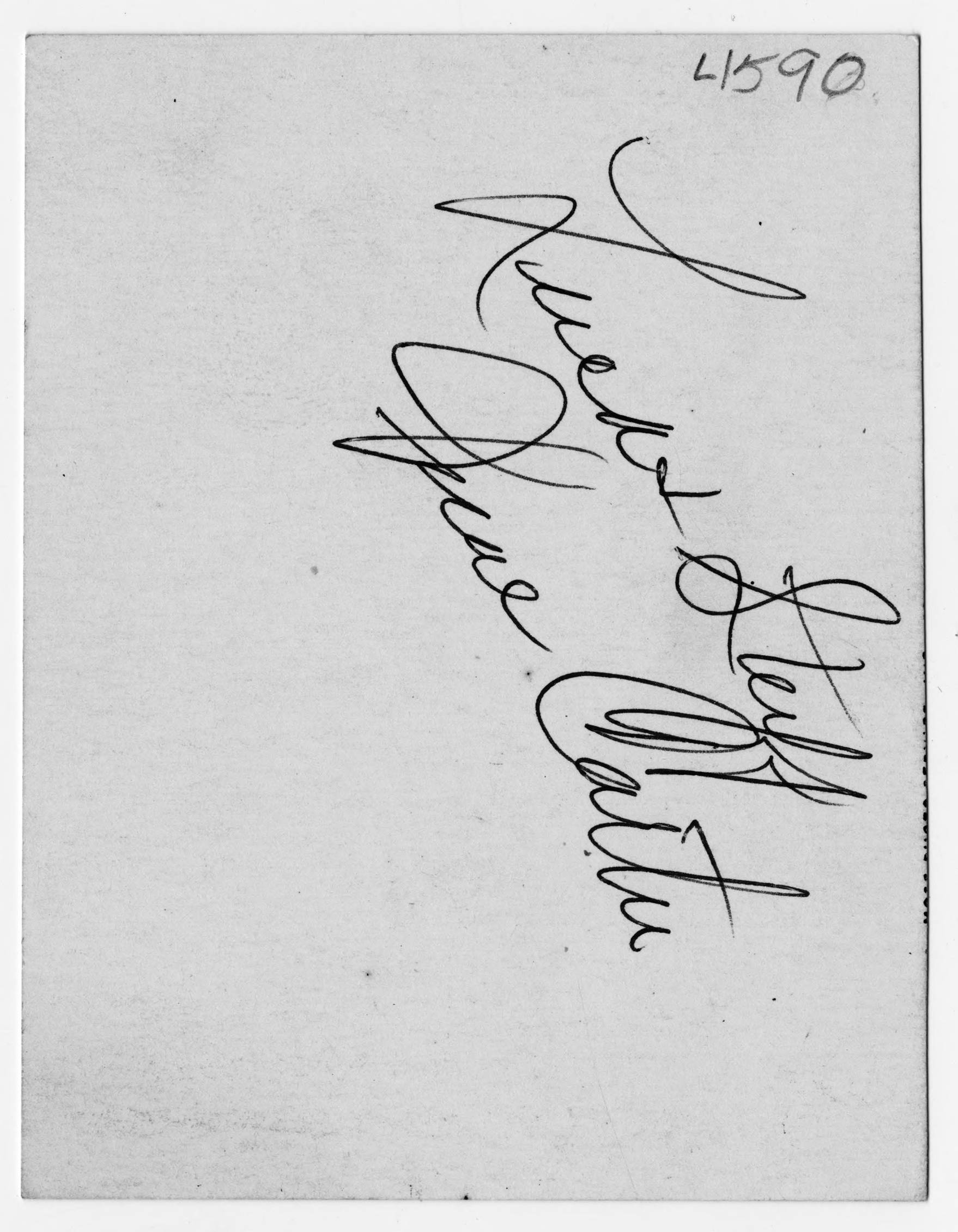
Cataloger's Corner: Du darfst nicht traurig sein
The Southern Folklife Collection is currently cataloging a large donation of reissue CDs that feature Austrian and German cabaret singers from the World War II era and after. Though most of the songs on these albums were written by German composers, there are a few American jazz standards and folk songs that receive the cabaret treatment—”Sweet Georgia Brown” for example, seems to have been a favorite among many female vocalists.
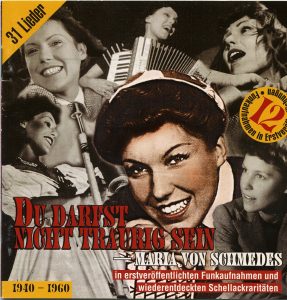
Another noteworthy example is the 1957 recording of “Oh Susanna” by Austrian singer and actress Maria von Schmedes (1917-2003). The sample below comes from the compilation album with a fantastic title Du darfst nicht traurig sein: die besten Schellackplatten und Funkaufnahmen – in Erstveröffentlichungen – von Maria von Schmedes, 1940-1960, (translation, “You must not be sad”) now cataloged and ready for patrons (CD-9676).
Maria von Schmedes, “Oh Susanna,” 1957
SFC Spotlight: Mountain Dance and Folk Festival, 1955
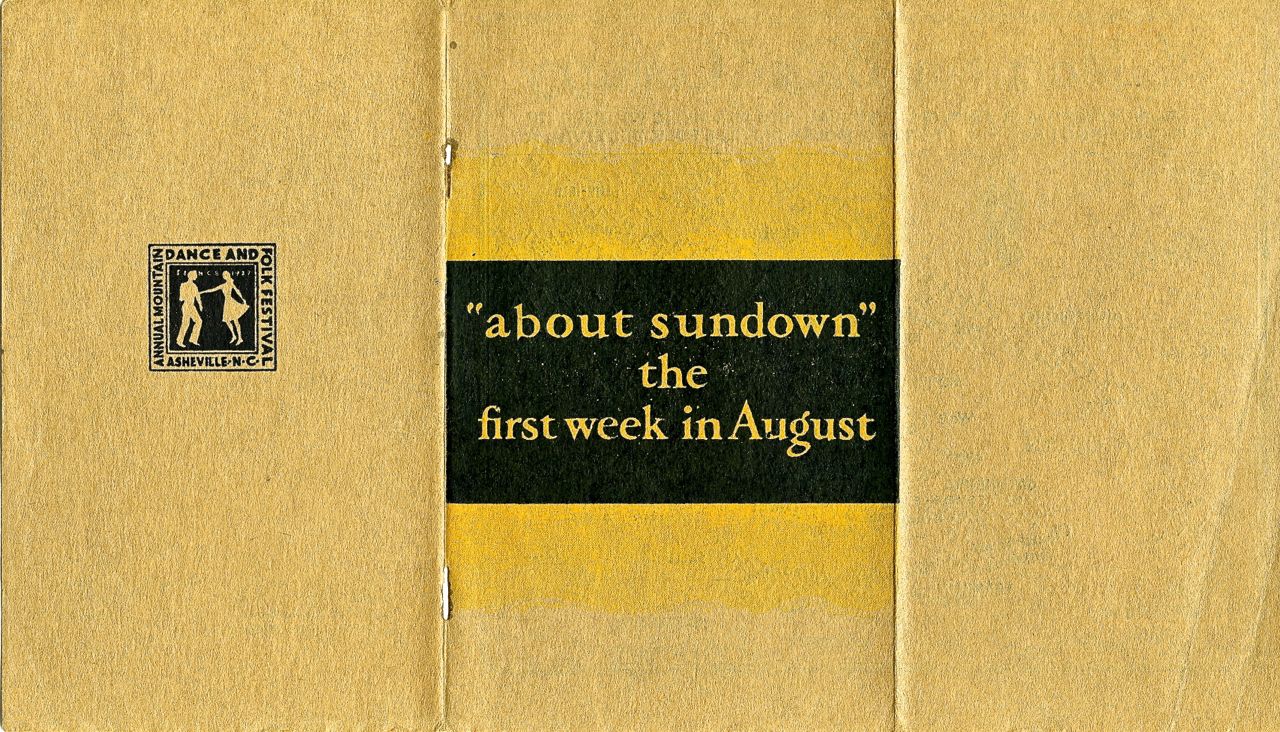
As the days continue to get shorter and we rarely emerge from the Southern Folklife Collection in time to catch the last light of the day, we welcome a ray of sunshine like this 1955 Asheville Chamber of Commerce informational pamphlet about Bascom Lamar Lunsford and the Mountain Dance and Folk Festival from Folder 368 in the Artus Moser Papers (collection #20005). The map on the inside cover is fantastic (click to enlarge).
 Ballad collector, educator, and historian Artus Monroe Moser was born 14 September 1894 in Hickory, N.C., to David Lafayette (Fayette) Moser and Cordelia Elizabeth King Moser. When Artus was two, the family moved to Buckeye Cove, N.C., located in Buncombe County near the Swannanoa Valley, where his mother had grown up and her family still lived. In 1904, Fayette Moser took a job as forester for the Biltmore Estate and moved the family there, where they remained until 1917 when Fayette became the North Carolina State Forest Warden on Mt. Mitchell. The family spent twelve years on Mt. Mitchell, then returned to Swannanoa after Fayette was hired as Warden for the Beacon Blanket Mill watershed.
Ballad collector, educator, and historian Artus Monroe Moser was born 14 September 1894 in Hickory, N.C., to David Lafayette (Fayette) Moser and Cordelia Elizabeth King Moser. When Artus was two, the family moved to Buckeye Cove, N.C., located in Buncombe County near the Swannanoa Valley, where his mother had grown up and her family still lived. In 1904, Fayette Moser took a job as forester for the Biltmore Estate and moved the family there, where they remained until 1917 when Fayette became the North Carolina State Forest Warden on Mt. Mitchell. The family spent twelve years on Mt. Mitchell, then returned to Swannanoa after Fayette was hired as Warden for the Beacon Blanket Mill watershed.
Growing up in the mountains of Western North Carolina instilled in Artus a deep respect for the traditions of Appalachia, which continued to influence him throughout his life. University of North Carolina in Chapel Hill, where he studied under historian R. D. W. Connor and received his A.B degree in 1923. During his time in Chapel Hill, Moser began to develop his lifelong interest in North Carolina history and folklore. After serving as principal of Swannanoa High School for two years, he returned to Chapel Hill to pursue an M.A. degree, which he received in 1926. During this time, he also worked as a research assistant under Howard W. Odum in the Institute for Research in Social Science. In the years after leaving Chapel Hill, Artus pursued further graduate work at the University of Wisconsin, Madison, and studied painting at the Pennsylvania Academy of Fine Arts, the Chicago Art Institute, and the Grand Central Art School in New York City. He worked as a professor of English and speech at the University of Tennessee at Knoxville before moving back to the Swannanoa area in 1943, where Artus taught in various schools until his retirement in 1964.
Artus began to collect ballads and folktales during his years in Tennessee, where he had encouraged his students to investigate their own heritage. He also contributed ballads to the collection of University of Tennessee folklorist Edwin C. Kirkland. Back in North Carolina, Artus avidly collected ballads and folktales in and around the western part of the state, recording local singer and storyteller Maud Gentry Long and musicians Jean Ritchie, Bascom Lamar Lunsford, and Pleaz Mobley, among others.
 Moser also collected biographical information about prominent Western North Carolinians, including some of the folklorists and ballad singers he recorded. The folder on Bascom Lamar Lunsford, Folder 368, contains information about him as well as about the Mountain Dance and Folk Festival he founded in 1927 in Asheville, N.C. Included it this pamphlet (click images to enlarge). We especially like the contact information for Mr. Lunsford on the final page, “Bascom Lamar Lunsford can be reached at his home, South Turkey Creek, Leicester, N. C., ten miles north of Asheville.”
Moser also collected biographical information about prominent Western North Carolinians, including some of the folklorists and ballad singers he recorded. The folder on Bascom Lamar Lunsford, Folder 368, contains information about him as well as about the Mountain Dance and Folk Festival he founded in 1927 in Asheville, N.C. Included it this pamphlet (click images to enlarge). We especially like the contact information for Mr. Lunsford on the final page, “Bascom Lamar Lunsford can be reached at his home, South Turkey Creek, Leicester, N. C., ten miles north of Asheville.”
See one last image below or visit us in Wilson Library and view the whole thing in our reading room. Don’t forget tickets are available for the second event in the Southern Folklife Collection Instrument Series celebrating the fiddle, Friday and Saturday, January 11-12 at UNC. The Friday concert in Memorial Hall features Nashville Bluegrass Band, Byron Berline, Matt Glaser and Bobby Taylor. The Saturday symposium in Wilson Library includes lectures and performances on American Fiddle Styles with Byron Berline, Matt Glaser Bobby Taylor, Paul F. Wells and Mark Wilson. Events are free and open to the public, but concert tickets are required for Friday night and available at Memorial Hall Box Office: 919.843.3333. 